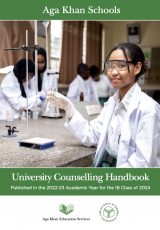Educating Girls in Science
Each project was aimed at community improvement, with creative ideas such as the preparation of fertiliser made of plants that are plowed back into the soil, known as green manure. Other projects included making fuel from waste paper and purifying salt water using solar power.
The girls were confident in, enthusiastic about and engaged with the projects they presented, demonstrating scientific knowledge and problem-solving capacities. This inspiring and innovative atmosphere is the direct impact of the Educating Girls in Science (EGIS) project.
The EGIS project is a two-year Aga Khan Academies outreach initiative funded by INTEL and the Aga Khan Foundation USA that empowers girls to use their education in the field of sciences to meaningfully contribute to their community. Rose Adhiambo, a student from Hassan Joho Girls Secondary School, has had her passion for science sparked through the project. “I can say that through EGIS, I have developed a positive attitude towards science,” she shares.
As it has done for Rose, the project aims to facilitate young girls’ passion for and success in the field of science. It strives to increase the number of girls advancing in the scientific field, improve the scientific learning process, and raise awareness of science as a life skill.
Meeting a global and local necessity
The EGIS project is directly addressing a globally recognised issue. Research conducted by the Organisation for Economic Co-operation and Development shows that girls lack confidence in their ability to solve math and science problems. This can be improved by changing girls’ attitudes towards the scientific field and by encouraging exposure to scientific roles. Mr Kirika, a science teacher from Mbaraki Secondary School, highlights how the EGIS project is directly tackling these global trends. “The students are not as they were,” he explains. “They have developed a lot of courage and confidence.”
The EGIS project also tackles other local considerations and barriers. Cultural practices in the communities of coastal Kenya place a heavy responsibility on girls and women to handle issues such as health, child rearing, agriculture, water supply and household maintenance. Secondary school, however, does not provide female students with the opportunity to utilise their scientific knowledge to tackle these and other issues facing their communities. Additionally, young girls need to be stimulated to consider a professional life in the sciences.
The EGIS project enables girls to handle the challenges of everyday life using scientific problem-solving skills while simultaneously empowering them to pursue careers in the sciences. Through empowering girls in this way, the EGIS project raises awareness amongst the community and educators about the ability of girls in the field of science. Mr Morris, the head teacher at Mreroni Primary School, explains why this empowerment is crucial. “Education is a facilitator of job creation and development,” he emphasises. “Let’s get it that women can compete equally with men.”The innovations and impact of the project
In achieving its objectives, EGIS utilises activity based science instruction. This educational model directly links scientific knowledge to the context and needs of local communities and everyday life. Students learn research skills and scientific principles that they then use to solve problems and undertake development initiatives. Through this innovation, science education is given the relevance and meaning necessary to facilitate a passion for the scientific field.
Inspiring this passion for the sciences in girls is the cornerstone of the EGIS programme. Students engage with one another in group projects, fostering collaboration, team spirit and a shared enthusiasm for the sciences. The project also includes a Peer Mentorship Programme that contributes to facilitating an interest in science among girls. Students are trained on how to invigorate their schools’ science clubs and on how to mentor younger girls in neighbouring primary schools to run their own science clubs.The impact the EGIS project is having on the mindset and potential of young girls is inspiring. Eden Ngatata, a Makupa Primary School class six student, feels exactly this. “You have made my favourite subject to be science,” she enthuses. “I’m aiming higher and higher so that the sky is the limit. But I think for us girls, we have no limit.”
Click here to read about the EGIS workshops held at AKA Mombasa in August 2015.
By Jahaan Pittalwala
Newsletter readers please click here to return to the newsletter (browser version)
publications




